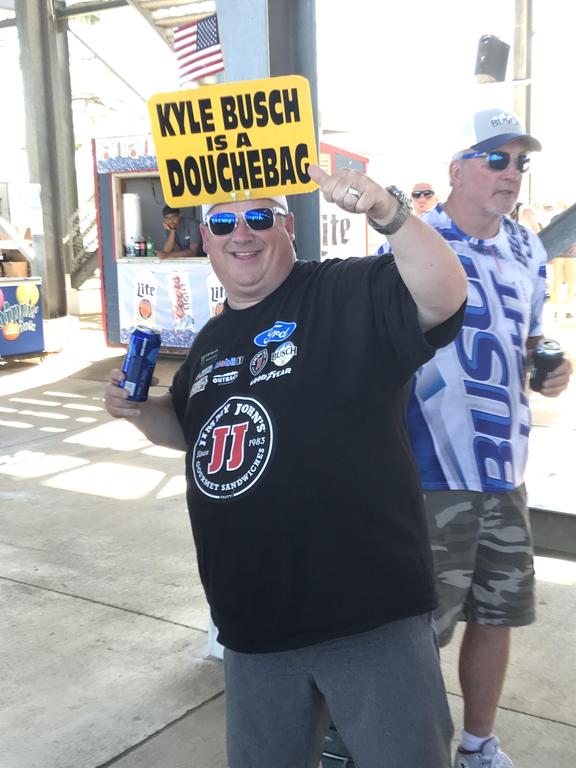- My Forums
- Tiger Rant
- LSU Recruiting
- SEC Rant
- Saints Talk
- Pelicans Talk
- More Sports Board
- Winter Olympics
- Fantasy Sports
- Golf Board
- Soccer Board
- O-T Lounge
- Tech Board
- Home/Garden Board
- Outdoor Board
- Health/Fitness Board
- Movie/TV Board
- Book Board
- Music Board
- Political Talk
- Money Talk
- Fark Board
- Gaming Board
- Travel Board
- Food/Drink Board
- Ticket Exchange
- TD Help Board
Customize My Forums- View All Forums
- Show Left Links
- Topic Sort Options
- Trending Topics
- Recent Topics
- Active Topics
Started By
Message
Kyle Busch loses $10.4m on IUL policies
Posted on 11/4/25 at 7:47 am
Posted on 11/4/25 at 7:47 am
Have we discussed this one yet?
LINK
LINK
quote:
Kyle Busch says he and his wife Samantha lost $10.4 million in 16 months due to a financial scheme involving an insurance policy that they believed would provide them with an annual income of $800,000 after Busch retired from racing.
quote:
Only took a day for an industry insider with access to the IUL illustrations to do a deep dive as to how @KyleBusch lost $8.5m on these IUL policies... High level deets... - 4 IUL @pacificlife PDX/2 policies - Likely $75-100m of death benefit ($62m on 2 policies) - $10.9m of cash premiums paid - 12x (!!!) higher cost of insurance due to being a NASCAR driver - Policy design that didn't leave $1 of commission on the table for Agent Rod Smith - Policy that was designed to lose 90% of its value to policy charges in the first 10 years. - Crediting rate of only 1.5% for 3 years b/c the agent left the cash value in a fixed cash account. - 3 policies lapsed despite $10.9m of premiums paid and a "6.1% policy performance" through 2023 H/T to @lifeproductrev for writing this up and making it public
quote:
LINK
Posted on 11/4/25 at 9:53 am to Shepherd88
In the words of Brad Keselowski "Kyle Busch is an arse!"
Posted on 11/4/25 at 10:32 am to NewIberiaHaircut
Thanks, saving this article for when my clients ask about insurance...most insurance sales people are only there to help one person, themselves.
Posted on 11/4/25 at 10:35 am to Maderan
quote:no blame to the policy holder looking to arrange a "sure thing" tax advantaged income stream well in excess of market performance with zero risk?
most insurance sales people are only there to help one person, themselves.
Posted on 11/4/25 at 10:57 am to cgrand
No, as most insurance products are sold like its magic that comes with a guarantee. He certainly didn't go to them and say I want to "arrange a "sure thing" tax advantaged income stream well in excess of market performance with zero risk".
His job was driving cars and he had to rely on trusted advisors to vet these types of things. Turns out the folks he was relying on weren't really looking out for him. Most sophisticated investors can't decipher what is going on in those policies or how they work.
Insurance has its place and can be a tool for the right situation.
His job was driving cars and he had to rely on trusted advisors to vet these types of things. Turns out the folks he was relying on weren't really looking out for him. Most sophisticated investors can't decipher what is going on in those policies or how they work.
Insurance has its place and can be a tool for the right situation.
Posted on 11/4/25 at 11:00 am to Maderan
quote:
Thanks, saving this article for when my clients ask about insurance...most insurance sales people are only there to help one person, themselves.
This right here, Whole life basically is just a policy for making insurance money
Posted on 11/4/25 at 11:15 am to UltimaParadox
quote:
Whole life basically is just a policy for making insurance money
I mean, there are certain instances where rich people use whole life policies for tax planning.
But I don’t even understand what this article is entirely saying. It sounds like he got caught up in a too good to be true situation.
Posted on 11/4/25 at 2:01 pm to Shepherd88
Wait a minute. A nascar driver only pays twice the premium?
Posted on 11/4/25 at 7:16 pm to Shepherd88
How can someone with his resources be so uninformed?
Posted on 11/4/25 at 9:56 pm to Shepherd88
Alright, I'll admit - I had to look up "IUL" policy.
According to Forbes
Guaranteed Universal Life
A GUL policy has a death benefit and premium payments that don’t change over time. Cash value growth may be minimal, but it is usually the cheapest type of universal life insurance.
Indexed Universal Life Insurance
IUL offers the potential to change your death benefit and premiums within certain limits. Cash value is tied to a stock market index, like the S&P 500, or a combination of indexes. Policy fees and charges are often high.
Variable Universal Life Insurance
A VUL policy allows you to change your death benefit and premiums within certain limits. You’ll select sub-accounts for cash value investments, which means you’ll need to actively manage this type of policy.
Can anyone give us more input and discussion on this?
According to Forbes
Guaranteed Universal Life
A GUL policy has a death benefit and premium payments that don’t change over time. Cash value growth may be minimal, but it is usually the cheapest type of universal life insurance.
Indexed Universal Life Insurance
IUL offers the potential to change your death benefit and premiums within certain limits. Cash value is tied to a stock market index, like the S&P 500, or a combination of indexes. Policy fees and charges are often high.
Variable Universal Life Insurance
A VUL policy allows you to change your death benefit and premiums within certain limits. You’ll select sub-accounts for cash value investments, which means you’ll need to actively manage this type of policy.
Can anyone give us more input and discussion on this?
This post was edited on 11/4/25 at 9:58 pm
Posted on 11/5/25 at 8:15 am to Contender54
My $.02 worth:
GUL is long "term" insurance, with actuarial costs baked in for the life of the contract. It is solely death benefit.
All other UL is garbage. Costs are highly adjustable causing premium increases at later policy ages. There is no reasonable mathematical calculation proof of a UL paying income for life as illustrated; maybe a small distribution figure, but increasing cost of the policies must be adhered and premium must be paid.
(I did not sleep at a Holiday Inn last night.)
GUL is long "term" insurance, with actuarial costs baked in for the life of the contract. It is solely death benefit.
All other UL is garbage. Costs are highly adjustable causing premium increases at later policy ages. There is no reasonable mathematical calculation proof of a UL paying income for life as illustrated; maybe a small distribution figure, but increasing cost of the policies must be adhered and premium must be paid.
(I did not sleep at a Holiday Inn last night.)
Posted on 11/5/25 at 4:03 pm to Shepherd88
The article isn't very informative I would like to know more but it sounds like the agent ginned up an illustration and straight up committed fraud.
Posted on 11/6/25 at 6:51 am to tigerfoot
quote:
Wait a minute. A nascar driver only pays twice the premium?
I’m seeing 12x?
If I’m reading that right, the agent didn’t pay his premiums? Is that correct? So what did the agent take the money and run? Is that not theft? What am I missing here?
I’m going to assume this is 10% or less of his net worth? So he was basically just diversifying?
ETA: lol, of course he did. This actually is fairly low I believe in regards to % commission
“The lawsuit also names Pacific Life agent Rodney A. Smith for steering the Buschs into an unsustainable, high-risk product, along with charging an up-front 35% commission they were unaware of.“
This post was edited on 11/6/25 at 7:01 am
Posted on 11/6/25 at 6:57 am to baldona
“Busch said he was told that if he paid a million dollars for five years, he would be able to take out $800,000 a year once he turned 52. “
I’m confused on where the 10.4 mil came from? He originally paid $5 mil, 5 installments of $1 mil.
I’m confused on where the 10.4 mil came from? He originally paid $5 mil, 5 installments of $1 mil.
Posted on 11/6/25 at 6:58 am to baldona
IIrC the whole concept is to overpay the premium to juice the cash value (money in excess of what’s needed for the life benefit) and that can be invested in an index fund to grow. Future premiums can come out of that so you don’t have to pay annually.
I’ve looked at this from a few different directions and the math never works out vs just investing yourself in an index other than the tax advantages. Sounds like agent did his math wrong and is now staring down the barrel of a big E&O suit.
I’ve looked at this from a few different directions and the math never works out vs just investing yourself in an index other than the tax advantages. Sounds like agent did his math wrong and is now staring down the barrel of a big E&O suit.
Posted on 11/6/25 at 7:00 am to baldona
The agent probably used some aggressive return percentage on the cash value that never materialized after all of the front loaded fees.
Posted on 11/6/25 at 7:12 am to SquatchDawg
quote:
The agent probably used some aggressive return percentage on the cash value that never materialized after all of the front loaded fees.
The insurance companies probably assume what like a 4% return to payout ? I wouldn’t doubt the agent showed an 8-10% return.
So they take out their 35% commission and another probably 10-20% in fees and ‘expenses’. Oh yeah there is the insurance aspect here. Then likely run the numbers on basically 50% of his money?
So there’s 0% chance if he thought he could invest $3 mil or so he would ever get $800k return anytime soon, that would have taken 30 years to accumulate enough value.
Posted on 11/6/25 at 7:13 am to SquatchDawg
quote:
IIrC the whole concept is to overpay the premium to juice the cash value (money in excess of what’s needed for the life benefit) and that can be invested in an index fund to grow. Future premiums can come out of that so you don’t have to pay annually.
Correct, and you also get the “insurance” value which at death is tax free.
Popular
Back to top

 7
7










